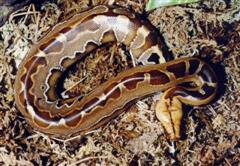Python - Borneo Blood
Short Tailed Python Scientific Name: Python curtus breitensteini
Tue, 29th April, 2025 - 3:36 am GMT
Sponsor Ads:

Alternative Name
Short Tailed Python Scientific Name: Python curtus breitensteiniBasic Info
While not very large for a python, the Borneo Blood Python is nonetheless an impressive looking snake. While they can reach up to seven feet in length, they are more commonly between four and six feet, with males being the smaller of the sexes. Blood Pythons are very stout snakes. They appear in a variety of shades including black, although black is rare. They can live over 25 years in captivity.
Health
Though some can become handleable, this species has a tendency to behave aggressively and adults can inflict a painful bite; so this snake is not recommended for children or novice snake keepers. The Borneo Blood Python should be kept in a large escape proof enclosure. A 75-gallon tank should be sufficient. The enclosure temperature should be about 80 degrees Fahrenheit with a daytime basking area about 90 degrees. It is important to maintain relative humidity of around 60 to 70%, as serious health problems can develop if the snake is too dry. Good substrates include newspaper, paper towels, and artificial grass or paper bags. Aspen bedding can also be used. Sand and gravel should never be used as they can cause intestinal blockage or "mouth rot" if ingested, and cedar should be avoided, as it is toxic to reptiles. Another substrate is a mix of moss-peat vermiculite and a little orchid bark. This mixture is quite good because it helps to retain proper humidity levels. They should not, however, be fed on this substrate; rather they should be fed in a separate container. They should be provided with 12 hours of light per day. Breeding Borneo Blood Pythons are sexually mature sometime between two and four years of age, usually when they reach lengths of three or four feet. In captivity, they usually breed between November and March. To breed a Borneo Blood Python, it is necessary to stop feeding. Dropping the nighttime temperature to around 75 degrees and shortening the daylight hours to around 9 hours per day, can induce breeding, as can misting the snakes with warm water. The female Borneo Blood Python will lay a clutch of between eight and thirty eggs. The eggs should be incubated at temperatures of between 88 and 90 degrees Fahrenheit and will hatch after between 70 and 80 days.Habitat
Borneo Blood Pythons make their homes in swampy areas, including rice patty fields.Behavior
The Borneo Blood Python is sometimes called the Short Tailed Python. They are fairly large snakes native to the island of Borneo. The temperament of the Borneo Blood Python varies greatly from snake to snake. While some members of the species are docile and placid, others can be quite nervous, which often manifests as aggression. They are very strong. Mature, large wild-caught snakes are often very aggressive. However, if acquired young and handled often, they can grow up to be very friendly. In the wild, Borneo Blood Pythons make their homes in swampy areas, including rice patty fields.Origin
Indo-PacificHistory
Although still common in the wild in Borneo, the Borneo Blood Python is decreasing in number due to human predation. They are very popular for their skin and are killed for meat.Common Foods
Borneo Blood Pythons usually feed on small to large rodents, including rabbits, mice, rats and guinea pigs in captivity.Sponsor Ads:
"When there's public debate and mass hysteria, that's when the patches roll in." -- Michael Meeks (GNOME Developer)
Python - Borneo Blood
Coded by: BGID® | ALL RIGHTS RESERVED Copyright © 2000-2025
Disclaimer | Privacy | Report Errors / Contact | Credits








 Why haven't we as a collective earth met with aliens yet?
Why haven't we as a collective earth met with aliens yet?  The Best Text Adventure You Will Ever Play! The official site:
The Best Text Adventure You Will Ever Play! The official site:  Homosexual behavior stems from the mind or genetics?
Homosexual behavior stems from the mind or genetics?  World EcoSystem - Biodiversity Changes - Who is on board and who isn
World EcoSystem - Biodiversity Changes - Who is on board and who isn  Mouthwash - Mouthrinse - Mouth Sores - Healing Infections - Gingivitis
Mouthwash - Mouthrinse - Mouth Sores - Healing Infections - Gingivitis  Treatment for Depression
Treatment for Depression  Ultra radical and violent Islamist group that even rivals Al Qaeda
Ultra radical and violent Islamist group that even rivals Al Qaeda  An idea to have teachers who want to carry guns to school undergo some level of police training will be left up to local school districts and police departments.
An idea to have teachers who want to carry guns to school undergo some level of police training will be left up to local school districts and police departments.